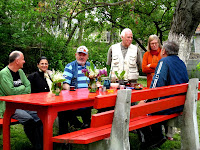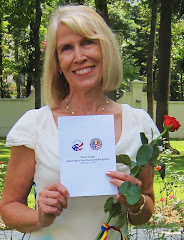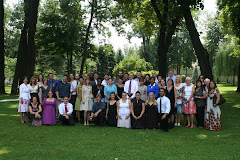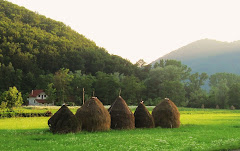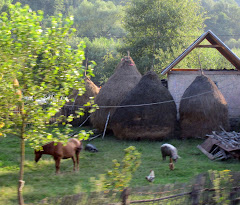I can think of no better way to answer people's questions about the economic situation in Romania and what needs to happen than to share Ambassador Mark Gitenstein's speech to the Bucharest Stock Exchange this past March. ***** BUILDING EQUITY MARKETS AND REFORMING ENERGY MARKETS IN ROMANIA
Talk by U.S. Ambassador Mark Gitenstein at the Bucharest Stock Exchange,
March 31, 2011
Distinguished Guests,
I want to thank you all for joining me here today at the Bucharest Stock Exchange, to talk about something we have all discussed many times: the future of Romania, especially its future economic growth. As many of you here already know, I am the proud descendant of Romanian immigrants to the United States more than a century ago, and this country is dear to my heart. Since my arrival here a little over a year and a half ago, I have had the privilege of working with many of you on a variety of issues that are not only important to the United States, and to our bilateral partnership, but which are important to the future of Romania because they affect each and every person in this country. These include our joint endeavors to strengthen Romania’s rule of law, support for reforms to stabilize the economy and spur a return to growth, and promote Romania’s assets and opportunities to potential investors.
The key to Romania’s future is building enduring institutions that under gird your democracy and free markets, transparency, rule of law and predictability. These reforms which began in the early part of the last decade helped to attract over 10,000 RON of foreign direct investment for every man, woman and child here in Romania. Furthering those reforms as your current government has been doing in the last two years is the only way to keep that foreign investment flowing and to generate more domestic investment here in Romania.
The most recent assessment by the IMF declared that these measures have succeeded in stabilizing and reversing the economic decline, and if the reform agenda moves forward, Romania can expect a return to positive growth this year and beyond.
That is why I am speaking to you today from the Bucharest Stock Exchange. You have not yet harnessed your equity markets in this effort.
Why are equity markets important? Growth cannot happen without a reliable energy supply and supporting infrastructure, and the energy sector here will require significant amounts of new investment if the sector is to be a driver for, and not a drag on, Romania’s recovery. Equity markets can play a critical role in attracting investment from here and abroad.
Romania’s infrastructure, roads, bridges and rails and especially the energy sector need capital but you must keep your deficits within IMF and EC limits. Just in the energy sector alone you need something in the range of 10 billion Euros to modernize the sector and thereby unleash your most important strategic assets. That CANNOT be accomplished with tax revenues alone.
And it will not happen as long as these assets are tied up in inefficient state-owned enterprises run by inexperienced political cronies making decisions based not on what’s best for the company but what serves their own interests. I believe that the right model for Romania is Poland whose government announced in 2009 that it would undertake a program to raise over 10 billion Euros by selling part of its interest in state enterprises. Poland did it without the government losing control of critical assets.
Imagine what that would mean for your budget, your energy sector and average Romanians – not just making energy cheaper and more abundant, but also building highways and bridges which would generate businesses and jobs for Romanians and perhaps even reverse some of the difficult budget cuts undertaken in recent years.
Poland did this not by giving preferential deals to political allies who bought the assets below their fair value, but by using its equity markets. Under the supervision of reputable financial managers these assets were offered on a transparent open market to the highest bidder. Ultimately many of these state companies will be owned by average Polish shareholders themselves.
That’s what should happen here. Average Romanians should own these companies.
In Poland there are over 1.5 million retail investors, average Poles who get up every morning, drive their own car to work, and earn a salary. In Romania there are probably less than 10,000 retail investors. That has to change.
Shares listed on the Warsaw Stock Exchange are worth over 200 billion Euros. The value of shares on the Bucharest Stock Exchange is less than 13% of that amount. So the market here has some distance to go.
In 2009, Poland was the only EU country to report economic growth, in part thanks to the country’s solid capital market. Last year, the PZU Group, one of Poland’s largest financial institutions, gave a successful initial public offering of 2 billion euro in the middle of an economic crisis. Through the first 11 months of 2010, Poland had 81 initial public offerings. Only China (442) and the USA (101) had more.
That’s one of the reasons that a recent survey listed Poland as one of the 10 top emerging markets in the world. Just this last year several of the top investment banking firms opened offices there. They see the potential.
That can happen here in Romania but not with the current proposed path. The on-going effort to reorganize state-owned energy companies into two “national energy champions,” instead of exploring full or partial privatization options, is not only an inefficient use of valuable resources, but as one outside expert commented, “contrary to government claims, the policy would significantly impede competition, crowd out private investment and raise prices.”
It is as we would say in America an effort to “rearrange the deck chairs on the Titanic” because it does not deal with the basic problem of state owned energy companies – that they are not run like real businesses.
Media reporting has shown that for at least ten years, more than 50% of Hidroelectrica’s output has been directed to preferential energy contracts at rates significantly lower than production cost. This has resulted in significant profit loss and lack of investment in the company, forcing the government to divert scarce public funding to keep the company afloat.
Similar allegations have been made against other energy complexes.
While giving wholesale energy discounts to large volume customers is not necessarily an unfair business practice, a state-owned company extending this benefit means subsidizing only a few users at the expense of all other consumers. An important distinction in Romania’s case is that access to these kinds of special discounts often seems to be a function of political connections rather than sensible business practice.
Other abuses include at least two examples in the recent past where the government literally used these state-owned enterprises as a “piggy bank” to deal with short term cash flow problems. For example, this past year Romgaz was asked to make a “donation” of 100 million Euros to the government to meet its budget exigencies, and government representatives on the board were directed to approve the “request.”
Your government also needs to move on the commitment it made to deregulate its energy price markets if Romania is to fully develop its energy resources. I understand the concern about the impact on individual consumers, especially those below the poverty level. But you can deal with this the way we do in the U.S., with effective regulation, and as in the U.S. and your neighbor Hungary, through targeted social subsidies for the poorest among you. It simply is no longer acceptable to keep all energy prices artificially low even for those who can afford it. As long as Romania chooses to refuse market pricing for gas and electricity, new investment in exploration and production will stay away. Romania will have chosen unnecessarily broad subsidies instead of new jobs, and imported resources instead of increasing its own supplies and potential exports.
But there are some good things happening in your equity markets and even in your energy sector. Just two months ago, to great applause, shares from the Property Fund (Fondul Proprietatea) were listed on this very stock exchange, capping years of preparation and anticipation. I believe this listing holds far greater significance for Romania’s economic future than most people realize. The Property Fund holds stakes in 83 private and state-owned Romanian companies, with energy companies comprising a major component of its portfolio. Successful listing of the Fund is prompting fund manager Franklin Templeton to broaden Romania’s exposure to global equity markets and to showcase Romanian investment opportunities to a vastly expanded global audience. This positive impact can be seen on the upward trend of the stock exchange since January. This is a terrific starting point to introduce more private capital to other potential growth areas, such as transportation, infrastructure and retail services. However, all investors will evaluate the risk of investing in Romania, including Government policies toward business, their stability, and how they are implemented.
The Property Fund and its presence on the boards of these state owned companies is having a perhaps even more important function. Property Fund board representatives are holding these companies and the Romanian Government accountable for bad decisions. For example, the Fund has challenged the so-called “donation” by Romgaz to the government. It is fighting the ill-conceived energy champions idea. It will fight the cronyism in the state companies and insist that they be run like real companies for the benefit of all shareholders, not just government bureaucrats. They are determined to get real value out of these strategic assets.
If the government would sell even larger portions of these assets in the market, like Poland is doing, the Property Fund would have more allies in this fight and in all likelihood those shares would eventually fall into the hands of average Romanians. And then average Romanians would not only own these companies but benefit from the increase in value that would come as these assets attain their market potential.
I cannot overstate the benefit that the “self policing” role that real equity ownership in these state companies would bring to Romania. As I said in the beginning, the real challenge for Romania is to build self- sustaining independent institutions which preserve the values of transparency and the rule of law that are critical to free markets, democracy and ultimately to personal autonomy and prosperity. Healthy equity markets, combined with representation of Romanian shareholders on the boards of these companies, is the best guarantee that the companies will act like modern businesses.
I am very impressed with the efforts you have taken since 2000 and especially in the last year or so, at great political cost, to reform the state. But it is not enough to reform the pay and pension laws; the Labor Code; the anti-corruption laws; to recruit good police and prosecutors and to start to reform the judiciary. That’s been difficult and it’s good. You should be proud of it.
But it is not enough. It is not enough to undertake these reforms to satisfy some bureaucrat in Brussels that you have complied with the CVM or that you should get into Schengen. It is more important and more lasting to empower average Romanians to insure transparency, predictability and to end corruption. In fact empowering average Romanians and offering them a brighter future might help you comply with CVM and gain Schengen entry.
More important than any single law or reform, the international community is seeking proof that that drive for reform is coming from inside Romania – not being imposed from the outside. I can think of no better means of demonstrating this commitment than privatizing your energy sector with the highest standards of corporate governance.
By kick-starting your equity markets and disbursing more wealth and power to individual investors you empower these investors to block abuses. Individual investors, average Romanians or their representatives, judged by how much value they bring to Romania not how many political points they score, sitting on these boards would do more than even the best prosecutors to end these abuses.
Lest you think I am being patronizing in these suggestions I hasten to add that we have been through all of this in the United States. It took us over 100 years to figure out that we needed to do the things I am suggesting here. Our Constitution was ratified with a Bill of Rights in 1789 and a hundred years later we were struggling with exactly the same issues you are here a mere 20 years after your revolution. We still have greedy people in America too and we’re still working on it.
In the 1890s we had wealthy railroad barons who ran their companies like political empires, owning newspapers, political parties and politicians. They benefited from generous hand outs from the federal government. Sound familiar?
We passed powerful new antitrust laws and created equity markets. Through stock ownership these companies eventually came to be run by independent shareholders.
President Teddy Roosevelt’s bust appears on our most revered memorial, Mount Rushmore, because he had the courage to use those laws. The New York Stock Exchange became the most powerful equity market in the world once it was freed from the control of the barons of industry. And even more important we realized the real value of America’s assets and with the help of free markets redistributed wealth to average Americans instead of concentrating wealth in a few oligarchs.
You can do this in Romania, like we did it in America and like your friends in Poland are doing. We are here to help, not simply because it is good for you but because it is good for us. Good for us because we will invest along with your citizens in these projects but also because it will make you even more reliable allies and trusted friends.
Thank you for listening and let us know how we can help.
 ...then one of me would surely still be in Romania, enjoying the friendship of some truly wonderful folks. My last four days in Oradea and Sintandrei (after finishing the Unitarian tour and bidding my fellow pilgrims goodbye in Targu-Mures) were a happy blur, starting with a good visit with Veronica Thursday night over dinner on the pedestrian mall in Oradea. We caught up on many details of our lives, summer travels, school gossip, and found so many things to laugh about. Vera has a lovely sense of humor, her dark eyes sparkling with amusement at life's ironies. I stayed at the new Ramada close to her apartment that night and was tickled that I had chosen not only the weekend of the Palinka and Wine Festival in Oradea (Toamna Oradeana), but also the Octoberfest sponsored by Ramada right in its parking lot!*** The next day, Friday, I had my trusted friend/taxi driver deliver me to my friends' home in nearby Sintandrei. Ana and Petre, their daughter Raluca and her husband Mihai had invited me to stay with them during this trip, and I was happy to be a part of their family for a few days. Only Petre was there when I arrived, the others at work, and he gave me a warm welcome, but I was soon off to my old school just a short walk away. It was wonderful to see the students, the faculty, and principal. I had candy corn and Halloween stickers for the kids, but they gave me the best gifts--enthusiastic hugs! They wanted to know if I were "back for the year," and I felt sincere regret in having to say no. And it was the European Foreign Language Day! So I watched their presentation in the media center at noon. Vera and my former colleague Andrada, the documentarian, organized the program with a power point presentation and readings.***
...then one of me would surely still be in Romania, enjoying the friendship of some truly wonderful folks. My last four days in Oradea and Sintandrei (after finishing the Unitarian tour and bidding my fellow pilgrims goodbye in Targu-Mures) were a happy blur, starting with a good visit with Veronica Thursday night over dinner on the pedestrian mall in Oradea. We caught up on many details of our lives, summer travels, school gossip, and found so many things to laugh about. Vera has a lovely sense of humor, her dark eyes sparkling with amusement at life's ironies. I stayed at the new Ramada close to her apartment that night and was tickled that I had chosen not only the weekend of the Palinka and Wine Festival in Oradea (Toamna Oradeana), but also the Octoberfest sponsored by Ramada right in its parking lot!*** The next day, Friday, I had my trusted friend/taxi driver deliver me to my friends' home in nearby Sintandrei. Ana and Petre, their daughter Raluca and her husband Mihai had invited me to stay with them during this trip, and I was happy to be a part of their family for a few days. Only Petre was there when I arrived, the others at work, and he gave me a warm welcome, but I was soon off to my old school just a short walk away. It was wonderful to see the students, the faculty, and principal. I had candy corn and Halloween stickers for the kids, but they gave me the best gifts--enthusiastic hugs! They wanted to know if I were "back for the year," and I felt sincere regret in having to say no. And it was the European Foreign Language Day! So I watched their presentation in the media center at noon. Vera and my former colleague Andrada, the documentarian, organized the program with a power point presentation and readings.*** Friday night with Vera's help I arranged for a dinner at the Mushroom Restaurant (Ciuperca) on a hillside overlooking the city. Felicia, my teacher friend from the scholastic high school in Oradea, her husband Horia, Vera, Mihai, Raluca, Ana, Petre, and Alina, their other daughter were my guests for a festive meal. I had no idea just HOW festive as an alumni group of musicians occupied half the restaurant with music, singing, and dancing as part of their program. At first I worried that we wouldn't be able to talk, but as the evening wore on, I could see that my guests were enjoying the show and I relaxed and enjoyed it, too.
Friday night with Vera's help I arranged for a dinner at the Mushroom Restaurant (Ciuperca) on a hillside overlooking the city. Felicia, my teacher friend from the scholastic high school in Oradea, her husband Horia, Vera, Mihai, Raluca, Ana, Petre, and Alina, their other daughter were my guests for a festive meal. I had no idea just HOW festive as an alumni group of musicians occupied half the restaurant with music, singing, and dancing as part of their program. At first I worried that we wouldn't be able to talk, but as the evening wore on, I could see that my guests were enjoying the show and I relaxed and enjoyed it, too. These good friends were so generous to me while I was in Romania last year and I wanted to at least show my gratitude with a little dinner party--such a small token! They deserved more.*** The next morning I found myself in my robe having coffee in Ana's kitchen bright and early with a gathering of their relatives I'd never met! It was corn harvesting day! We hit the field and worked for a few hours before coming back to the garden table for a huge breakfast, and then back to the field to finish up. Mihai's brothers, one of their wives, and a niece all helped out with good humor and great appreciation for Ana's excellent cooking. The weather was perfect and I thoroughly enjoyed this bit of farm labor with good company.*** Later I watched Mihai's niece Edina prepare for her troupe's dance performance at the festival that night. So much ironing of the many layers, many ruffles and yardage of the beautiful costume. Actually getting into the whole ensemble wasn't easy either!
These good friends were so generous to me while I was in Romania last year and I wanted to at least show my gratitude with a little dinner party--such a small token! They deserved more.*** The next morning I found myself in my robe having coffee in Ana's kitchen bright and early with a gathering of their relatives I'd never met! It was corn harvesting day! We hit the field and worked for a few hours before coming back to the garden table for a huge breakfast, and then back to the field to finish up. Mihai's brothers, one of their wives, and a niece all helped out with good humor and great appreciation for Ana's excellent cooking. The weather was perfect and I thoroughly enjoyed this bit of farm labor with good company.*** Later I watched Mihai's niece Edina prepare for her troupe's dance performance at the festival that night. So much ironing of the many layers, many ruffles and yardage of the beautiful costume. Actually getting into the whole ensemble wasn't easy either!  Watching her dance at the festival was special after observing all the necessary work beforehand. And the festival was fun. Besides the dances from many villages, stalls all over the park offered tastings of palinka and wine from small wineries and stills. The wonderful Hungarian tube bread with various coatings was being baked on site and the aroma permeated the air. Cotton candy and candied apples and bon bons were all around. Why are these people not more rotund?? Then we joined Vera and her friend and daughter back at the Octoberfest site for a round of German beer and sausage and German patriotic music. Bidding farewell to Veronica was the only sad part of the day. (Photos of the weekend) *** Sunday morning I was delighted to learn that Ana and Petre would also come along with us to Budapest to deliver me to the airport there. They--in their mid fifties--had never been to the city and Mihai decided it was a good time for them to see the sights! So we were a jolly group making the 2 1/2 hour drive in Mihai's comfortable car on a fast toll road. What a difference from the shuttle van I've taken before slowly through many small villages! We teased Ana who was nervous about the speed of our travel, something she wasn't used to. Finally it was time to say goodbye. They came into the airport with me, Ana giving me a bag of fruit to take along, and all of us having good hugs and double kisses. I wish these dear souls lived closer. I can envision returning for special times--Vera's wedding, the house blessing of Mihai and Raluca's new home, their child's christening--but I know distance and practicality get in the way. Still, I'm hoping to see Vera next April if she can meet me in Verona where Lee will be teaching for three weeks, and Mihai thinks the house is coming along and should be ready in a year or so, so who knows? The pull of friendship is strong and can shrink the globe in remarkable ways. Peace to all. May you be grateful citizens of this planet Earth. May you live a beautiful poem.
Watching her dance at the festival was special after observing all the necessary work beforehand. And the festival was fun. Besides the dances from many villages, stalls all over the park offered tastings of palinka and wine from small wineries and stills. The wonderful Hungarian tube bread with various coatings was being baked on site and the aroma permeated the air. Cotton candy and candied apples and bon bons were all around. Why are these people not more rotund?? Then we joined Vera and her friend and daughter back at the Octoberfest site for a round of German beer and sausage and German patriotic music. Bidding farewell to Veronica was the only sad part of the day. (Photos of the weekend) *** Sunday morning I was delighted to learn that Ana and Petre would also come along with us to Budapest to deliver me to the airport there. They--in their mid fifties--had never been to the city and Mihai decided it was a good time for them to see the sights! So we were a jolly group making the 2 1/2 hour drive in Mihai's comfortable car on a fast toll road. What a difference from the shuttle van I've taken before slowly through many small villages! We teased Ana who was nervous about the speed of our travel, something she wasn't used to. Finally it was time to say goodbye. They came into the airport with me, Ana giving me a bag of fruit to take along, and all of us having good hugs and double kisses. I wish these dear souls lived closer. I can envision returning for special times--Vera's wedding, the house blessing of Mihai and Raluca's new home, their child's christening--but I know distance and practicality get in the way. Still, I'm hoping to see Vera next April if she can meet me in Verona where Lee will be teaching for three weeks, and Mihai thinks the house is coming along and should be ready in a year or so, so who knows? The pull of friendship is strong and can shrink the globe in remarkable ways. Peace to all. May you be grateful citizens of this planet Earth. May you live a beautiful poem.











